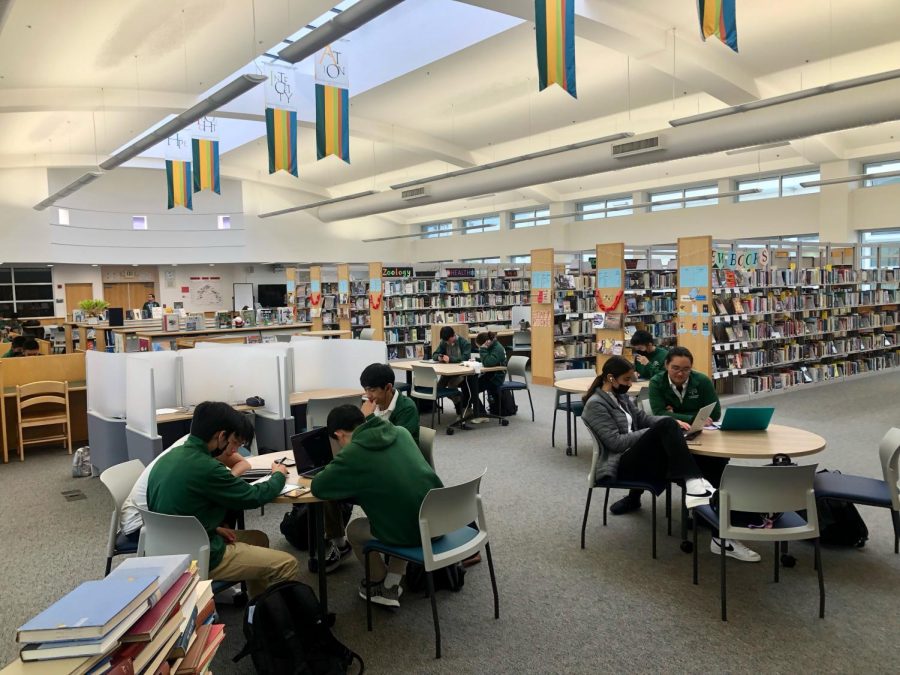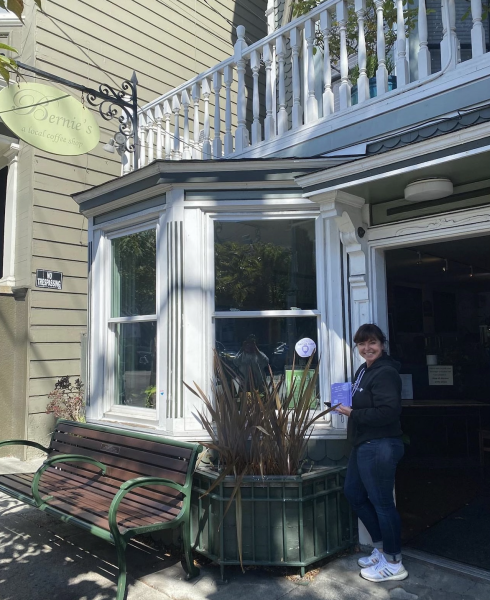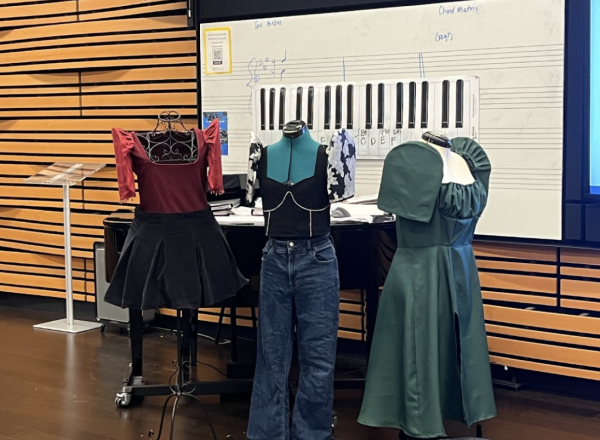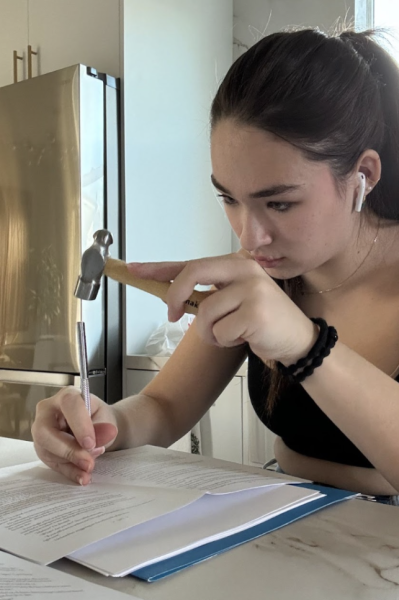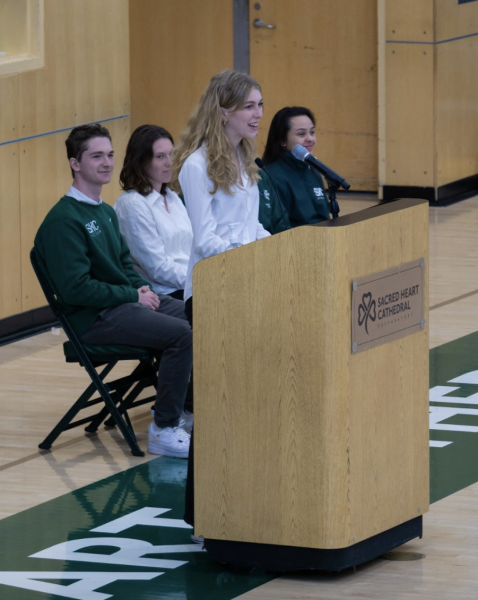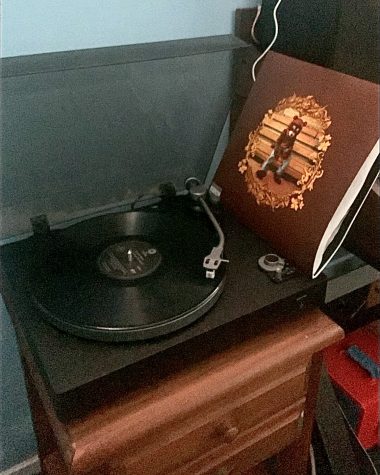Tips for New Students: Finals Edition
Students studying for finals in SHC’s library.
Following up on August’s Tips for New Students, the Emerald’s Leadership Team pulled together recommendations for finals studying as winter rolls around.
Lucrezia (Lulu) McClellan ‘23: Head of Multimedia
With finals coming up soon, my most effective tips for preparing are to delete distracting apps, exercise, and begin studying early. Removing distracting apps from my phone is my go to whenever I really need to settle down and focus on studying. I periodically delete apps such as TikTok and Instagram for a couple weeks to stop myself from accidentally wasting valuable time. On top of technology focus, exercising really helps me to relieve stress and gives me the mental break I need, whether it is soccer practice, lifting, or just going on a walk around my neighborhood. It also makes me feel more focused when I do homework and helps me to get better sleep at night. Finally, I always start studying early.For each class, I usually make a study guide with vocabulary and central concepts on a Quizlet, and study a little every day for 2 weeks leading up to the final. I have made the mistake of trying to cram the night before and 9 times out of 10 it doesn’t end well.
Riley Dickman ‘23: Head of Publicity
The best tip I have to prepare for finals is to study in groups or with teachers. Many teachers are more than willing to help you with creating review materials and studying before and after classes. Additionally, studying in small groups helps with staying on task. Talking through the content can be really beneficial for studying. Another tip is to take mock quizzes and tests to help study. Taking practice tests or quizzing yourself is a really good way to reinforce your memory of the content and it often helps highlight what you still need to study. Finally, I would say that it is a good idea to stop studying at 8pm the night before the final. Any last minute cramming done late at night does not stick and I have found that I feel the most focused the next day when I go to bed early and skim over my notes in the morning.
Nicole Mabborang ‘23: Managing Editor
Finals week is almost here! To study and be informed as best as possible, here are tips and notes I have.
Tip #1: Make a final exam game plan with the time, date, and location!
This can be found in the SHC Announcements Schoology group page in the resources section. It is titled “2022-23 Final Assessment & Study Week Schedule.” Recording all of your finals and their details, either on a Google Doc or a sheet of paper, will ensure you know what you are getting into.
Tip #2: Be aware of weighting, formats, and materials.
Final exams are weighted 20 percent of your final grade, along with the two quarter grades weighted at 40 percent apiece. If you are unfamiliar with the format and permitted materials, then make sure to ask your teacher for clarification and write this down.
Tip #3: Don’t be afraid to ask questions!
When met with confusion, it is important to ask your teacher for help and get the answers you need. They are always willing to help and will likely be happy that you are taking the initiative to shore up any issues.
Tip #4: Start early and prioritize what you know needs more time.
Do not cram! It may be tempting, but in order to maximize the information you can retain, make sure to start early. Prioritize what subjects or smaller topics need more attention.
Tip #5: Be creative with the resources that teachers provide, or even create your own.
Your teachers will give you study guides and supplemental materials to help you study. Make your own flashcards, study guides, become a teacher, and even create maps and diagrams! Creative and imaginative study materials may help you remember content better than simple notes.
Tip #6: Practice active studying – study smarter not harder!
Reading is not studying. It can be your first step to studying, but make sure to advance your study with active studying: explain material in your own words, ask questions as you read and reread!
Tip #7: Have a good night’s rest the night before and a healthy breakfast!
It is very important to get at least seven to eight hours of sleep the night before your final. It reduces stress, improves your mood, and helps you think more clearly. Eating a healthy breakfast also improves your energy and ability to concentrate.
William Holland ‘23: Head Copy Editor
The best advice I can give for finals is to start studying a few days before you think you really need to. This will give you time to figure out what you may need to focus on more and what you might want to talk to a teacher about for some extra help. The teachers at SHC are always willing to help you shore up any weak areas, especially in the weeks before finals. Taking the time to talk to them will, if nothing else, show that you are interested in and committed to the subject, which can only help you come grading time. Studying earlier will maximize your chances of performing well on your finals, even if you think it’s unnecessary. The best thing to be when walking into an exam is over prepared. Worst case scenario, you get a very good grade.
It may seem obvious, but make sure to really study the aspects you do not understand rather than hoping they will not appear on a test. Some people like to focus on the subjects that they feel comfortable with because doing well makes them feel confident in their overall abilities. However, this is a false confidence that will disappear as soon as they get to a question they cannot answer. It is much better to feel the discomfort of not knowing what you are doing weeks before the final than when you take the test. Do not be afraid to admit you don’t understand something. Be afraid of ignoring it all together.
Finally, do NOT cram a ton of studying into the night before a final. The best thing you can do is review the most important things before going to bed early. Staying up all night to memorize dates or verb tenses might seem like a good idea, but 9 times out of ten you’ll do worse on the test than if you had just gone to sleep earlier. If you are awake and alert when you’re taking a test, oftentimes you can extrapolate the answer to a tough question from what you DO know. The answer may well be in your head if you spend all night studying, but you’ll likely be hard pressed to find it when the only thing on your mind is your bed. Trust yourself and your studying, get as much sleep as possible, and go easy on the caffeine.
Adilene Ryan ‘23: Head of Layout and Design
A helpful practice to study for finals is to go over all of the semester’s quizzes and tests. The finals won’t have any new information because they are accumulations of the last two quarters, so do not stress yourself out about potential surprise questions–they won’t be there. Other than that, look over any important activities or essays you’ve completed so far, as those are usually indicative of what your teacher thinks are the most important concepts of the course. Make sure you have those down, too. It’s also crucial to not spend all of your waking hours thinking about and studying for these finals. They are important, but they are not life-altering. Do not hole up in your house for the next two weeks, because whatever difference that makes in your performance is (in my opinion) not worth wasting that much of your life for. That being said, take them seriously. It does feel great to do well on something you’ve worked hard for.
Atessa Anoshiravani ‘23: Editor-in-Chief
As a list-lover, one of my favorite ways to be sure I am as prepared as possible for finals (or really any big test) is to create a loose schedule. First, I make a list of everything I want to do to study before the final exam — items such as making a study guide, going through notes, practicing flashcards, and reviewing old tests and quizzes. Once I have a list of everything I want to do for each class, I’ll make a calendar working backwards from the date of the exam, planning what I will do to study for which class on which days. There are plenty of ways to split studying up over days, such as by chapter, by task, or by what makes sense chronologically. What’s useful about this practice is that once I have completed my list for each class, I feel completely prepared on the day of the exams. This method also helps me figure out how much time I need to study for each class — I can focus solely on two or three classes each day leading up to finals week, and depending on the task lists, I’m able to effectively split my time so that each topic gets the attention it needs.
One thing to note: almost always, my studying does not go exactly to plan. Part of being able to study effectively is not allowing the entire schedule to be derailed by one off day. I’ll often prioritize certain tasks over others, so if I run out of time, I know what I can drop and still feel confident going into the exam. This method breaks down scary-seeming to-dos like “study for chem” into smaller, more manageable tasks.
Kylie Hansen ‘23: SHC Live Liaison
When it comes to finals, it is important to make your own study guides, rather than using your peers’ material. Though borrowing a friend’s study guide may seem more efficient, you will have better chances of remembering information if you are writing it yourself and not just reading others’ work. Also, another tip I live by is sleeping early. Finals are not worth compromising your wellbeing for, so make sure to get enough sleep and have things to look forward to on the last day of finals. I recommend going on an outing with your friends on the last day; like heading to the ice rink or getting a cup of hot chocolate! Most importantly, do not be the person who constantly refreshes their Powerschool waiting to see their final grade during winter break. You will not be able to go back and make corrections to your final, so leave it be.
Isabella Rinaldi ‘24: Assistant Editor-in-Chief
Building effective study habits is one of the hardest yet most critical things to employ in high school as it sets you up for success in your future academic career. It is easy to imagine all of the things you have to do for your various classes, the tests you have to study for, the notes you have to take, all while being involved in sports, clubs, and/or work. That mental image alone is daunting. That is why I have found it very effective to keep track of my assignments, upcoming tests, etc. on a planner (whether digital or physical) to visualize what I need to get done, and experience the relieving and rewarding feeling of marking it as done after I have finished. I personally like to keep a digital planner, since I use my computer in most classes and it is the quickest and most accessible way to write down what I need to do before I forget. It is really easy to fall into the rabbit hole of relying on Schoology to remind you of your assignments– trust me, I have been there. However, taking the small extra step to either write down your homework/ assignments down by hand or type them out not only provides you with a visual aid of what needs to get done, but also reinforces that thought and helps you remember to do it.
Now, the next hurdle (especially during study week) is figuring out how and when to study. Bringing yourself to actually study is undoubtedly the most difficult task. I find that setting a time in your calendar and scheduling study time is very important to hold yourself accountable. You can do this by setting reminders on your phone, putting it into your calendar, or asking a friend or family member to remind you. In my experience, having a study-buddy is the best motivation to study and do homework. Whether that be a classmate, a tutor, a friend, or even a group of friends– find people who will motivate you to stay on task and that can make studying a joint effort. When we are alone, oftentimes it is easy to get distracted and even harder to get back on task since no one is there to hold us accountable. But when studying with someone who is responsible and/or strong in that subject, it forces you to be present and dedicated to your task in the moment.
If you have any of your own questions about studying, email the Emerald at [email protected] or stop by for one of our meetings (every other Wednesday after school in Room 508 on La Salle).
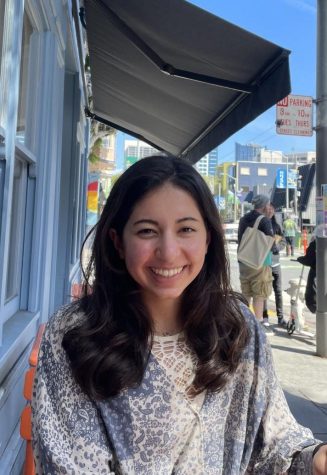
After three years of writing and editing for the Emerald, Atessa is serving as Editor-in-Chief during her final year at SHC. She’s an avid bookworm and...
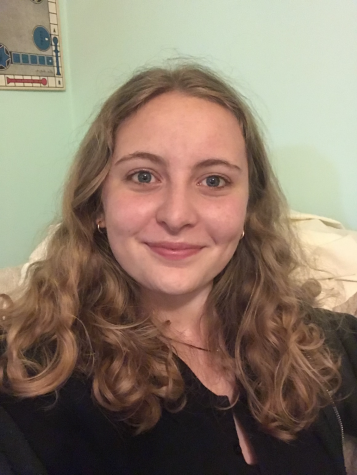
Working on Layout and Design, Addy loves seeing the designs she creates digitally come to life in a physical newspaper! She enjoys gathering article, photo,...

William Holland is excited to serve as Head Copy Editor in his final year at SHC, with a goal of maintaining the Emerald's high-quality articles....
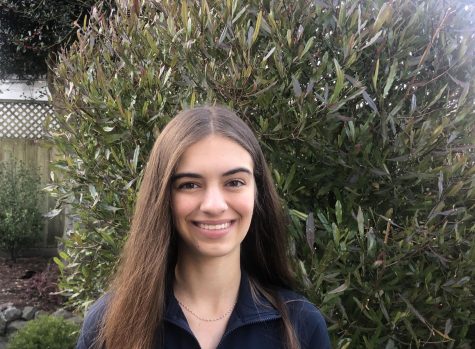
This year, Riley is serving as Head of Publicity, making sure that the Emerald is promoted on campus and online. Aside from the Emerald, she is a...

This school year, Kylie is serving as the SHC Liaison and is eager to continue writing for the Emerald. In addition to being a part of the Emerald,...

Lucrezia McClellan , or Lulu, is a senior at SHC and the Head of Multimedia for the Emerald. She manages and oversees all the content for the Emerald...

Nicole Mabborang is excited to serve her final year at SHC as the Managing Editor for the Emerald, ensuring the quality of articles and coordinating...

After three years of writing and editing for the Emerald, Isabella (Isa) serves as the Managing Editor in her final year. She loves to read, write,...

